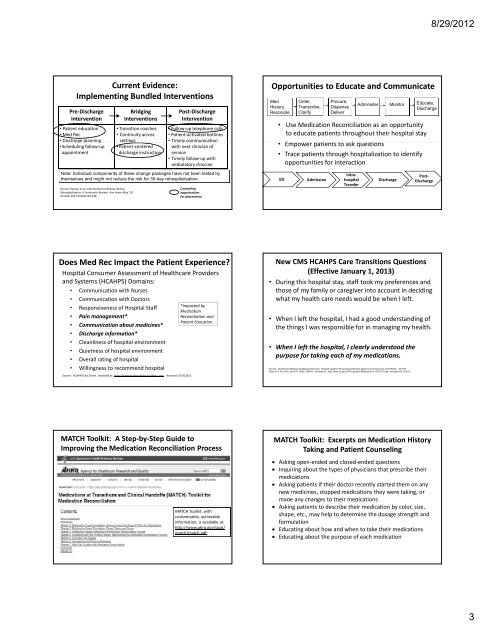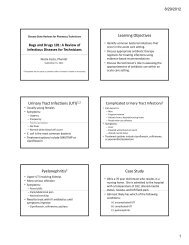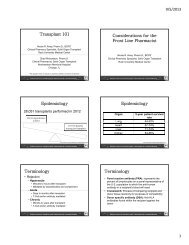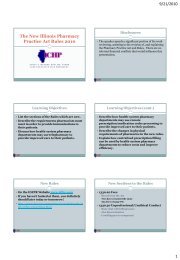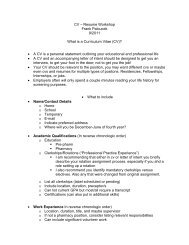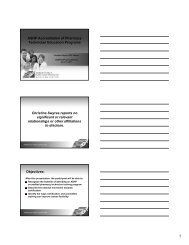Presentation Outline ICHP Annual Meeting September 13-15
Presentation Outline ICHP Annual Meeting September 13-15
Presentation Outline ICHP Annual Meeting September 13-15
You also want an ePaper? Increase the reach of your titles
YUMPU automatically turns print PDFs into web optimized ePapers that Google loves.
Current Evidence:<br />
Implementing Bundled Interventions<br />
Pre‐Discharge<br />
Intervention<br />
• Patient education<br />
• Med Rec<br />
• Discharge g planning p g<br />
•Scheduling follow‐up<br />
appointment<br />
Source: Hansen et al. Interventions to Reduce 30‐Day<br />
Rehospitalization: A Systematic Review. Ann Intern Med. 18<br />
October 2011;<strong>15</strong>5(8):520‐528.<br />
Bridging<br />
Interventions<br />
Post‐Discharge<br />
Intervention<br />
• Transition coaches • Follow‐up telephone calls<br />
• Continuity across • Patient‐activated hotlines<br />
settings g<br />
• Timely y communication<br />
•Patient‐centered with next clinician of<br />
discharge instruction service<br />
• Timely follow‐up with<br />
ambulatory clinician<br />
Note: Individual components of these change packages have not been tested by<br />
themselves and might not reduce the risk for 30-day rehospitalization.<br />
Counseling<br />
opportunities<br />
for pharmacists<br />
Does Med Rec Impact the Patient Experience?<br />
Hospital Consumer Assessment of Healthcare Providers<br />
and Systems (HCAHPS) Domains:<br />
• Communication with Nurses<br />
• Communication with Doctors<br />
• Responsiveness of Hospital Staff<br />
• Pain management*<br />
• Communication about medicines*<br />
• Discharge information*<br />
• Cleanliness of hospital environment<br />
• Quietness of hospital environment<br />
• Overall rating of hospital<br />
• Willingness to recommend hospital<br />
Source: HCAHPS Fact Sheet. Available at: http://www.hcahpsonline.org/facts.aspx . Accessed 7/19/2012<br />
*Impacted by<br />
Medication<br />
Reconciliation and<br />
Patient Education<br />
MATCH Toolkit: A Step‐by‐Step Guide to<br />
Improving the Medication Reconciliation Process<br />
MATCH Toolkit, with<br />
customizable, actionable<br />
information, is available at:<br />
http://www.ahrq.gov/qual/<br />
match/match.pdf<br />
Opportunities to Educate and Communicate<br />
Med<br />
History,<br />
Reconcile<br />
Order,<br />
Transcribe,<br />
Clarify<br />
Procure,<br />
Dispense<br />
Deliver<br />
Administer Monitor Educate,<br />
Discharge<br />
• Use Medication Reconciliation as an opportunity<br />
to educate patients throughout their hospital stay<br />
• EEmpower patients ti t to t ask k questions ti<br />
• Trace patients through hospitalization to identify<br />
opportunities for interaction<br />
ED Admission<br />
Intra‐<br />
hospital<br />
Transfer<br />
Discharge<br />
Post‐<br />
Discharge<br />
New CMS HCAHPS Care Transitions Questions<br />
(Effective January 1, 20<strong>13</strong>)<br />
• During this hospital stay, staff took my preferences and<br />
those of my family or caregiver into account in deciding<br />
what my health care needs would be when I left.<br />
• When I left the hospital hospital, I had a good understanding of<br />
the things I was responsible for in managing my health.<br />
• When I left the hospital, I clearly understood the<br />
purpose for taking each of my medications.<br />
Source: Centers for Medicare & Medicaid Services. Hospital Inpatient Prospective Payment Systems for Fiscal Year 20<strong>13</strong> Rates. 42 CFR<br />
Parts 412, 4<strong>13</strong>, 424, and 476 [CMS-<strong>15</strong>88-F]. Available at: http://www.ofr.gov/OFRUpload/OFRData/2012-19079_PI.pdf. Accessed 8/<strong>13</strong>/2012<br />
MATCH Toolkit: Excerpts on Medication History<br />
Taking and Patient Counseling<br />
• Asking open‐ended and closed‐ended questions<br />
• Inquiring about the types of physicians that prescribe their<br />
medications<br />
• Asking patients if their doctor recently started them on any<br />
new medicines, stopped medications they were taking, or<br />
made d any changes h to their h medications d<br />
• Asking patients to describe their medication by color, size,<br />
shape, etc., may help to determine the dosage strength and<br />
formulation<br />
• Educating about how and when to take their medications<br />
• Educating about the purpose of each medication<br />
8/29/2012<br />
3


